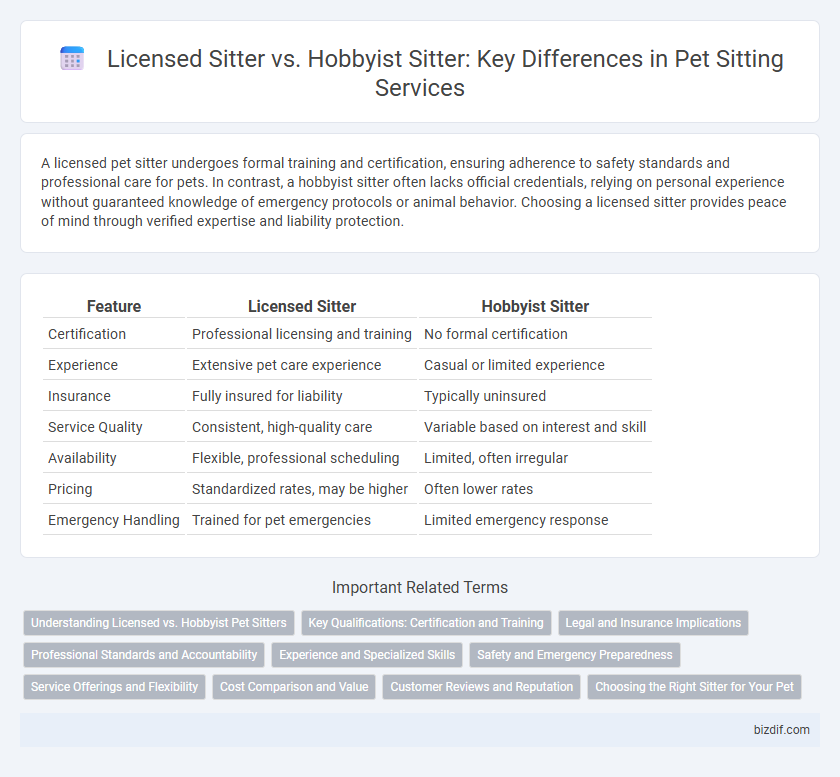A licensed pet sitter undergoes formal training and certification, ensuring adherence to safety standards and professional care for pets. In contrast, a hobbyist sitter often lacks official credentials, relying on personal experience without guaranteed knowledge of emergency protocols or animal behavior. Choosing a licensed sitter provides peace of mind through verified expertise and liability protection.
Table of Comparison
| Feature | Licensed Sitter | Hobbyist Sitter |
|---|---|---|
| Certification | Professional licensing and training | No formal certification |
| Experience | Extensive pet care experience | Casual or limited experience |
| Insurance | Fully insured for liability | Typically uninsured |
| Service Quality | Consistent, high-quality care | Variable based on interest and skill |
| Availability | Flexible, professional scheduling | Limited, often irregular |
| Pricing | Standardized rates, may be higher | Often lower rates |
| Emergency Handling | Trained for pet emergencies | Limited emergency response |
Understanding Licensed vs. Hobbyist Pet Sitters
Licensed pet sitters possess formal certifications and comply with industry standards, ensuring professional care and accountability for pets. Hobbyist sitters typically offer informal services without regulatory oversight, which may result in variable reliability and expertise. Choosing a licensed sitter often guarantees enhanced safety, specialized training, and insurance coverage for your pet's well-being.
Key Qualifications: Certification and Training
Licensed pet sitters hold certifications such as Pet First Aid and CPR, ensuring they are trained to handle emergencies and provide professional care. Hobbyist sitters often lack formal training or certification, which can impact their ability to manage pet health issues or behavioral challenges. Certification from organizations like Pet Sitters International or the National Association of Professional Pet Sitters guarantees a higher standard of competence and reliability.
Legal and Insurance Implications
Licensed pet sitters hold professional certifications and liability insurance, ensuring compliance with local regulations and providing financial protection against accidents or damages. Hobbyist sitters typically lack formal licensing and may not carry insurance, increasing legal risks for both pet owners and sitters in case of injury or property damage. Choosing a licensed sitter mitigates potential legal liabilities, securing peace of mind through verified credentials and insured services.
Professional Standards and Accountability
Licensed pet sitters adhere to strict professional standards, including certifications, background checks, and ongoing training to ensure high-quality care and safety for pets. Hobbyist sitters typically offer informal services without formal accountability or industry-recognized credentials, which can result in inconsistent care. Professional accountability through licensure provides pet owners with reliable guarantees and recourse in case of negligence or emergencies.
Experience and Specialized Skills
Licensed pet sitters possess formal training and certifications, ensuring they have extensive experience managing pet health, behavior, and emergency situations. Hobbyist sitters often care for pets out of personal interest but may lack the specialized skills required for administering medications or handling unique breed needs. Choosing a licensed sitter ensures professional expertise and peace of mind, especially for pets with specific health or behavioral challenges.
Safety and Emergency Preparedness
Licensed pet sitters undergo rigorous training in animal care and emergency response protocols, ensuring a higher level of safety and preparedness during pet sitting assignments. Hobbyist sitters may lack formal certifications, which can limit their ability to handle unexpected health or safety emergencies efficiently. Choosing a licensed sitter provides peace of mind through verified skills in administering medication, recognizing distress signs, and executing emergency plans.
Service Offerings and Flexibility
Licensed pet sitters provide comprehensive services including health monitoring, administering medication, and emergency response, ensuring professional care tailored to specific pet needs. Hobbyist sitters often offer basic care such as feeding, walking, and companionship, with more limited availability and less formal training. The flexibility of licensed sitters typically includes adjustable schedules and customized care plans, whereas hobbyists might have fixed hours and fewer service options.
Cost Comparison and Value
Licensed pet sitters typically charge higher rates due to professional training, certifications, and insurance coverage, ensuring comprehensive care and reliability. Hobbyist sitters often offer lower costs but may lack formal expertise and accountability, which can affect the quality and safety of pet care. Evaluating cost versus value involves considering the sitter's credentials, experience, and the peace of mind provided by licensed professionals compared to budget-friendly options.
Customer Reviews and Reputation
Licensed pet sitters often have verified credentials and certifications, reflected in consistently high customer reviews emphasizing professionalism and reliability. Hobbyist sitters may accumulate positive reviews based on personal passion but lack formal validation, resulting in varied reputation scores. Customers typically trust licensed sitters more due to documented expertise and accountability, impacting overall satisfaction and repeat booking rates.
Choosing the Right Sitter for Your Pet
Selecting the right pet sitter involves evaluating credentials, with licensed sitters offering certified expertise, insurance coverage, and formal training that ensure professional care standards. Hobbyist sitters may provide personalized attention and lower costs but often lack the professional oversight and liability protection associated with licensed services. Prioritize sitters who demonstrate verified experience, positive client reviews, and clear communication to meet your pet's specific health and behavioral needs effectively.
Licensed sitter vs Hobbyist sitter Infographic

 bizdif.com
bizdif.com